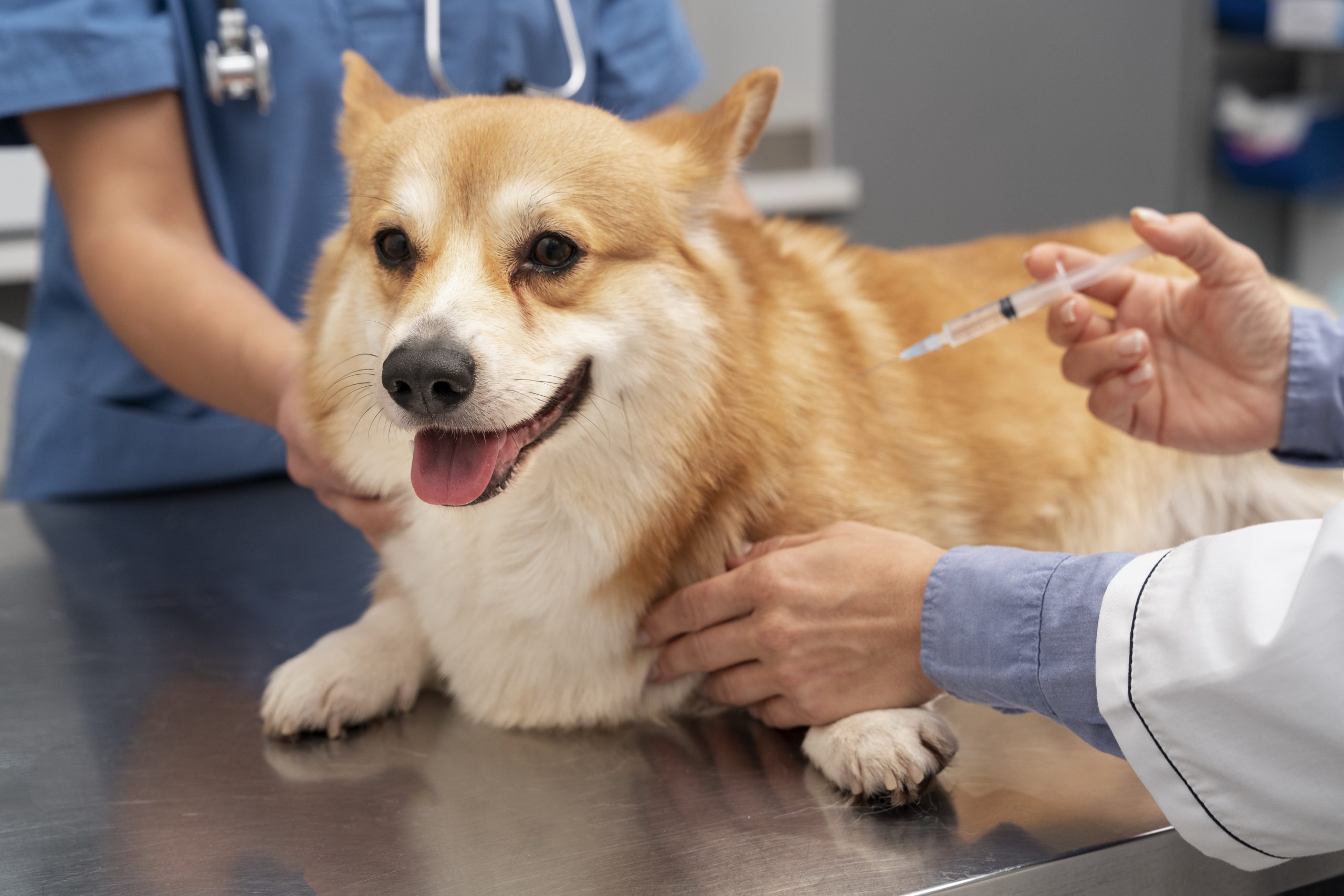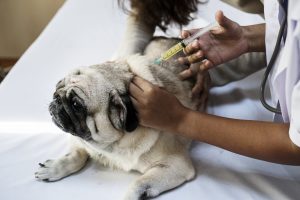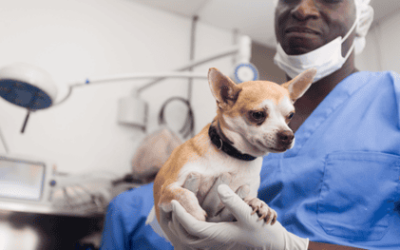Lepto Vaccine for Dogs [How Often & Side Effects]

Understanding Leptospirosis: Impact on Canine Health
Leptospirosis is a bacterial infection that affects dogs worldwide. It is caused by the Leptospira bacteria, which can be found in contaminated soil, water, and the urine of infected animals, such as rats, raccoons, and skunks. This disease poses a significant threat to canine health, as it can lead to kidney and liver damage, respiratory issues, and even death if left untreated. The bacteria can also enter their system through cuts or abrasions on their skin or by drinking or inhaling contaminated substances.
Is Human Transmission of Leptospirosis from Dogs Possible?
The primary concern regarding leptospirosis is the health of our furry friends, but it’s also essential to address the potential for human transmission. Although rare, humans can contract leptospirosis from infected dogs. This typically occurs through direct contact with the urine or bodily fluids of an infected dog or by exposure to contaminated environments.
It is crucial to practice good hygiene when handling dogs with leptospirosis, such as wearing gloves and thoroughly washing hands.. Additionally, maintaining a clean living environment and properly disposing of any waste is essential to minimize the risk of transmission.
What is the Lepto Vaccine for Dogs?
The lepto vaccine for dogs is a preventive measure that helps protect our furry companions against leptospirosis. This vaccine contains inactivated Leptospira bacteria strains, which stimulate the dog’s immune system to produce antibodies. These antibodies then provide protection against future infections.
The lepto vaccine is typically administered as part of a combination vaccine, which also protects against other common diseases like distemper, hepatitis, and parvovirus. It is important to consult with your veterinarian to determine the most suitable vaccination schedule for your dog based on their age, lifestyle, and risk factors.
Understanding the Importance of the Lepto Vaccine for Dogs
The lepto vaccine plays a crucial role in safeguarding the health and well-being of our canine companions. Leptospirosis can be a severe and potentially fatal disease, and the vaccine offers the best defense against it. By vaccinating our dogs, we not only protect them but also reduce the risk of transmission to humans and other animals.
The vaccination stimulates the immune system to produce antibodies specific to the Leptospira bacteria. These antibodies help neutralize the bacteria, preventing it from causing illness. While the vaccine does not provide 100% immunity, it significantly reduces the severity of the disease if a vaccinated dog becomes infected.
Common Side Effects of the Lepto Vaccine for Dogs
Like any medical intervention, the lepto vaccine for dogs may have some side effects, such as soreness at the injection site, mild lethargy, and a mild fever. However, it is essential to note that these side effects are generally mild and temporary. In rare cases, more severe reactions can occur, such as an allergic response or anaphylaxis. It is crucial to monitor your dog closely after vaccination and seek immediate veterinary attention if you notice any concerning symptoms.
Lepto Vaccine Schedule for Dogs: How Often Should it Be Given?
The lepto vaccine schedule for dogs depends on various factors, including the dog’s age, lifestyle, and risk of exposure. In general, puppies should receive their initial lepto vaccine at around 12 weeks of age, with a follow-up booster shot two to four weeks later. Adult dogs should receive a yearly booster to maintain protection.
However, it is essential to consult with your veterinarian to determine the most appropriate schedule for your dog. Your veterinarian will consider your dog’s specific needs and risk factors to ensure adequate protection against leptospirosis.
Where is the Lepto Vaccine Given in Dogs?
The lepto vaccine is typically administered via an injection, either subcutaneously or intramuscularly. The most common site for injection is the loose skin between the shoulder blades, as it allows for easier access and absorption of the vaccine.
It is important to note that only a licensed veterinarian or a trained veterinary professional should administer the lepto vaccine, as they have the knowledge and experience to ensure proper administration and minimize any potential risks.
Does the Lepto Vaccine Make Dogs Tired?
Some dogs may experience temporary lethargy or tiredness after receiving the lepto vaccine. This is considered a normal response and typically resolves within a day or two. If your dog continues to exhibit fatigue or any other concerning symptoms, it is important to consult with your veterinarian for further evaluation.
The Significance of Annual Lepto Vaccine for Dogs
Annual vaccination against leptospirosis is crucial to maintain immunity and protect our dogs from this potentially life-threatening disease. The immunity provided by the vaccine may decrease over time, making booster shots necessary to ensure continued protection.
Regular vaccination not only safeguards our dogs but also helps in reducing the overall prevalence of leptospirosis in the canine population. By vaccinating our pets, we contribute to the collective effort of disease prevention and control.
Exploring Other Options Besides the Lepto Vaccine
While the lepto vaccine is highly effective in preventing leptospirosis, it is worth considering additional preventive measures, especially if your dog is at a higher risk of exposure. These measures may include avoiding areas with standing water or known wildlife habitats, using tick and flea preventives, and practicing good hygiene after outdoor activities.
It is crucial to discuss these options with your veterinarian to determine the best approach for your dog’s specific circumstances. They will be able to provide personalized recommendations based on your dog’s lifestyle and risk factors.
How can pet insurance help you in this situation?

Pet insurance can provide peace of mind and financial support in situations where your dog requires veterinary attention. Pet insurance can help ensure that your furry companion receives the necessary medical care without incurring exorbitant expenses.
Reimbursement
This method is the most common for pet insurance companies. You pay out of pocket for the veterinarian bill, and then the insurance company reimburses you for what’s covered under the insurance plan. The steps look like this.
- You pay the vet bill after your dog’s visit.
- You fill out the pet insurance claim form.
- Submit the claim form and other required documentation to the insurer.
- After the claim is approved, you will be reimbursed for eligible expenses.
Odie’s Illness and Injury pet health insurance plan offers comprehensive coverage for your dog.
What Does Odie Pet Insurance Cover?
Pet insurance covers various veterinary expenses, providing financial protection and peace of mind for pet owners. Here are the details of the coverage options offered by Odie Pet Insurance:
Illness & Injury Plan
The Illness & Injury Plan is an all-inclusive insurance plan designed to cover a wide range of medical needs for your pet. This plan includes comprehensive coverage for various illnesses, injuries, and veterinary services. Some of the covered items include:
- 24/7 Televet Chat
- Emergency vet visits
- Overnight hospital stays
- IV Fluids & Medications
- Medical Supplies
- Surgeries
- MRI/CAT Scans
- Rehabilitative Care
- Prescription Medications
- Gastrointestinal issues
- Laboratory Tests
Accident-Only Plan
The Accident-Only Plan is designed for pet owners seeking coverage specifically for accidents. This plan provides financial protection for emergency veterinary care resulting from accidental injuries. It includes 90% reimbursement up to $10,000 each year, with a $250 annual deductible.
Here’s an overview of the Accident-Only Plan:
- Coverage for broken bones, sprains, eye injuries, and traumatic dental fractures.
- Coverage for wounds, including bite wounds, lacerations, snake bites, and bee stings.
- Veterinary treatments covered for accidental injuries include X-rays & ultrasounds, laboratory tests, emergency care, hospitalization, CT scan & MRI, and surgery.
The Wellness Add-on Plan
The Wellness Plan is an add-on for routine care coverage you can purchase with an insurance policy. It focuses on preventive care and covers routine veterinary services, such as the lepto vaccine. Odie has two wellness plan options available:
Basic Plan:
- Covers services such as spay/neuter and teeth cleaning, rabies vaccination, flea & tick prevention, heartworm prevention, vaccination/titer, wellness exam, heartworm test or FELV screen, blood, fecal, parasite exam, microchip, urinalysis or ERD, and deworming.
- Reimbursement up to $305 per year.
Plus Plan:
- Ideal for puppies and kittens.
- Covers services such as spay/neuter and teeth cleaning, rabies vaccination, flea & tick prevention, heartworm prevention, vaccination/titer, wellness exam, heartworm test or FELV screen, blood, fecal, parasite exam, microchip, urinalysis or ERD, and deworming.
- Reimbursement up to $535 per year.



